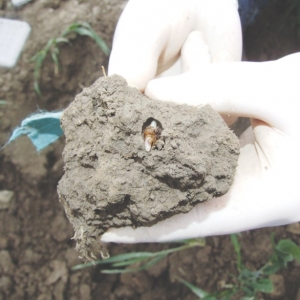A NATIVE fly, Ostenia robusta, is being assessed as a possible biocontrol for grass grub after an unprecedented find of its larvae predating the pasture pest last spring.
Foundation of Arable Research staff found the fly maggots gobbling grass grub pupa alive last November during a grub collection for another project. Research manager Richard Chynoweth says they couldn’t quite believe what they were seeing.
“Grass grub is one of New Zealand’s most costly, and therefore most researched pest insects, but we had no knowledge of this sort of predation occurring.”
The grubs were in a paddock of wheat near Southbridge, about 20km southwest of Christchurch, following two years of clover. Between 35 and 50% of grubs per sample were attacked.
“They were all at about 25cm below the surface where grass grubs pupate.”
With the help of Lincoln University, the maggots – which ranged from 5mm to 18mm – were reared in the lab until they pupated, and two adults were successfully hatched. Only with those two adults was the species identified; as DNA tests on the maggots had failed to find a matching species.
A search of the scientific literature about O.robusta and grass grub then confirmed the predation observed was unprecedented.
“Larvae of this fly had never been found and studied before, although adult flies were in several New Zealand museum insect collections,” explains Chynoweth. “They had also never been recorded as having any sort of association with grass grub, another native species.”
Chynoweth told Rural News there are other flies which predate grass grub, but these haven’t been found on the Canterbury Plains and they’ve already been dismissed as potential biocontrols. This was because they have very little impact on grass grub numbers, unlike the 35-50% kill seen in the Southbridge paddock.
Fly traps placed across mid and central Canterbury last summer to try to catch adult O.robusta drew a blank, but more maggots attacking grubs were found. However, these are yet to be confirmed as the same species. Attempts to catch adults will be repeated this summer with traps set lower than the 1m setting used last year.
“Our main aim for this project now is to learn more about the distribution and the biology of this insect and to confirm that last year’s finding wasn’t just a one-off,” says Chynoweth.
“Once we have more information about O. robusta we can start to make decisions about whether or not it is has potential for use within integrated pest management systems.”
The find and subsequent research was reported at last month’s New Zealand Plant Protection Society conference, Napier.
“There was a lot of interest and a lot of questions we couldn’t answer.
“Why it’s not been found before is one of the big ones, given the amount of research on grass grub, but there hasn’t been that much exploration [of grass grub] at the pupation stage.”
When the grubs pupate they’re immobile for about a month, making them vulnerable to attack, which appears to be the window when the fly’s maggots take advantage of, he explains.
“They attack from the outside, piercing the skin and sucking out its insides.”
How the adult flies find grass grub infested sites to lay eggs, so the food source for the maggots is on hand, is another question yet to be answered.
“It could be some kind of pheromone.”
FAR is hopeful a Masters student or two at Lincoln University will take the research into the fly forward. Depending on the results of that, AgResearch may then come on board to look at developing it into a viable biocontrol, as they have done with the parasitic wasp that attacks clover root weevil.



















